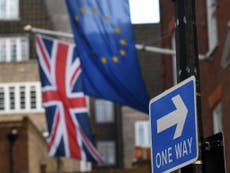Brexit: ‘Catastrophic’ risk to lawyers, architects and other professionals being ignored, peers warn
Lucrative services sector cannot prepare for potentially huge new obstacles to trading in the EU – because it is ‘not sure what to prepare for’
Your support helps us to tell the story
From reproductive rights to climate change to Big Tech, The Independent is on the ground when the story is developing. Whether it's investigating the financials of Elon Musk's pro-Trump PAC or producing our latest documentary, 'The A Word', which shines a light on the American women fighting for reproductive rights, we know how important it is to parse out the facts from the messaging.
At such a critical moment in US history, we need reporters on the ground. Your donation allows us to keep sending journalists to speak to both sides of the story.
The Independent is trusted by Americans across the entire political spectrum. And unlike many other quality news outlets, we choose not to lock Americans out of our reporting and analysis with paywalls. We believe quality journalism should be available to everyone, paid for by those who can afford it.
Your support makes all the difference.Architects, engineers, lawyers and other professionals have been forgotten in the Brexit talks and could suffer a “catastrophic” hit, peers warn today.
Firms in the vital services sector face potentially huge new obstacles to trading in the EU – but cannot prepare “because they are not sure what to prepare for”, the report concludes.
Yet the sector is worth a colossal £225bn to the UK economy, providing 4.6 million jobs, while the UK and EU fight over fishing rights worth a miniscule amount in comparison.
Ministers must secure mutual recognition of qualifications, the right to cross-border travel and prevent national governments imposing their own restrictions, the Lords EU services sub-committee said.
Different restrictions enforced by separate EU capitals would be “catastrophic for the UK’s professional and business services”, its inquiry was told, it notes.
Baroness Donaghy, the committee’s chair, said: “We are concerned that they have been overlooked in the negotiations so far.”
The committee’s report comes with just 79 days until the end of the post-Brexit transition period, during which existing rules and regulations have been maintained.
It points out that Boris Johnson’s deal called for an “ambitious, comprehensive” deal for services, including “most favoured nation” status for both sides.
But, the report said, free trade in services requires people to be able to move across borders, for firms to be able to set up offices and mutual recognition of standards and qualifications.
Furthermore, it is member states – not Brussels – that make many of those rules, which raises the threat of “national reservations” to protect sectors from foreign competition.
Warning a free trade deal was, by itself, “no silver bullet”, Baroness Donaghy said: “These barriers to trade must be prevented.
“It is essential that issues such as EU member state national reservations to the agreement, the mutual recognition of professional qualifications and business mobility are dealt with properly in a future UK-EU agreement.
“Despite being so close to the end of the transition period, many businesses, especially SMEs [small businesses], are not well prepared, not least because they are not sure what to prepare for.”
The sector includes “advertising, legal services, market research, accountancy, audit, architecture, engineering, PR and management consulting”.
The hoped-for trade deal must “explicitly commit not to tie market access” to having an established local office or residency rights, the report said.
While freedom of movement will end, arrangements for business travel should be “as ambitious and comprehensive as possible”.
The alarm is also raised over the UK’s failure to secure a “data adequacy” agreement with the EU – something not expected to be agreed until long after the end of the transition, on 31 December.
In June, the security minister, James Brokenshire, admitted the UK was taking “sensible steps to prepare for a situation where that decision may not be in place”.






Join our commenting forum
Join thought-provoking conversations, follow other Independent readers and see their replies
Comments